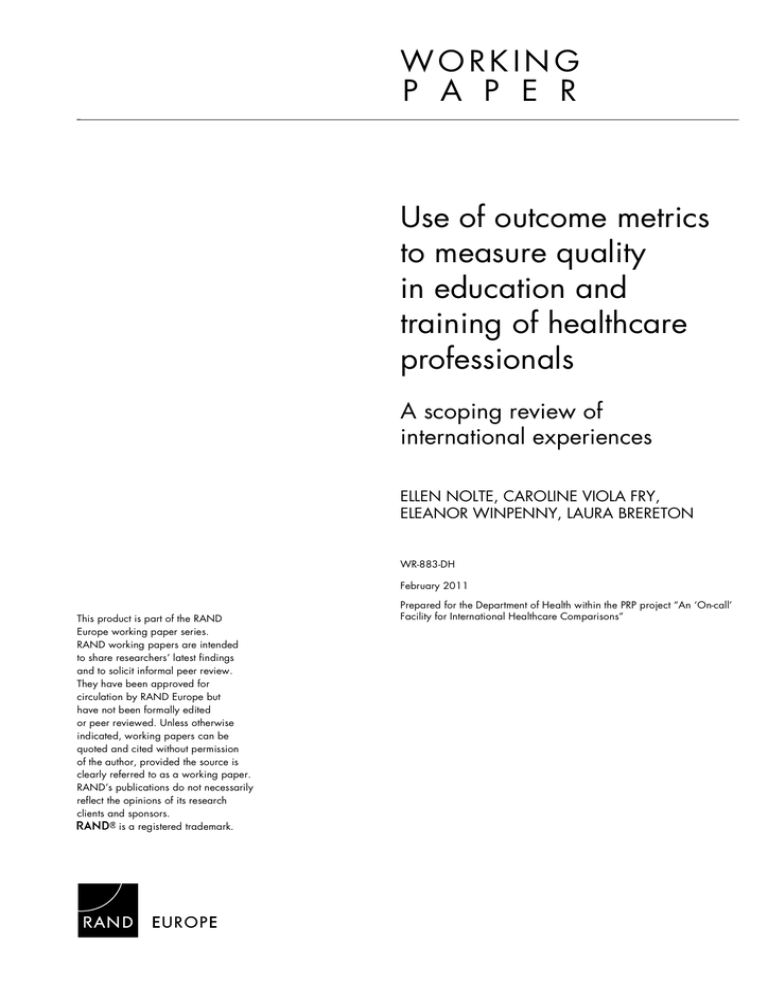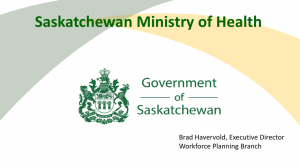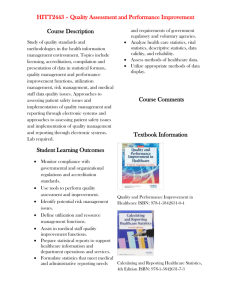Document 12781584
advertisement

WORKING P A P E R Use of outcome metrics to measure quality in education and training of healthcare professionals A scoping review of international experiences ELLEN NOLTE, CAROLINE VIOLA FRY, ELEANOR WINPENNY, LAURA BRERETON WR-883-DH February 2011 This product is part of the RAND Europe working paper series. RAND working papers are intended to share researchers’ latest findings and to solicit informal peer review. They have been approved for circulation by RAND Europe but have not been formally edited or peer reviewed. Unless otherwise indicated, working papers can be quoted and cited without permission of the author, provided the source is clearly referred to as a working paper. RAND’s publications do not necessarily reflect the opinions of its research clients and sponsors. is a registered trademark. Prepared for the Department of Health within the PRP project “An ‘On-call’ Facility for International Healthcare Comparisons” Summary 1. In its 2010 Consultation document ‘Liberating the NHS: Developing the Healthcare Workforce’ the Coalition Government proposed a new framework for workforce development in the health sector that commits to the delivery of “high quality education and training that supports safe, high quality care and greater flexibility”. As part of this commitment, it proposes an outcomes framework for workforce planning, education and training involving quality metrics, building on ongoing work on indicator development for commissioning non-medical and medical education and training. 2. This brief report provides a rapid review of the published evidence on initiatives undertaken at international and national levels that may inform the further development of the proposed outcomes framework. It is designed as an exploratory review, with a focus on the use of quality indicators to assess and monitor the delivery of healthcare education and training in international settings. 3. Assuring and enhancing the quality of care should form the ultimate goal of high quality training but the available evidence of a direct association between the quality of healthcare education and training and the quality of care provided remains scant. Evidence that is available tends to be limited to specific fields. The academic literature is beginning to address these issues and future work should aim to systemically assess emergent evidence. 4. We find that there is increasing interest and activity, nationally and internationally, in the further development of the healthcare workforce to better meet the present and future needs of a changing healthcare environment. However, the overarching focus of relevant initiatives tends to be on workforce planning and while education and training is seen as core component of planning as a means to secure (future) supply, efforts to systematically assess the quality of the delivery of education and training of the healthcare workforce appear to be rarely addressed explicitly. 5. Several countries are employing implicit or explicit accreditation schemes of medical schools and programmes, but the extent to which such schemes can be used to extract metrics for monitoring remains uncertain. A review by the Belgian Health Care Knowledge Centre (2010) of the experiences of the use of quality criteria for training settings and trainers in postgraduate medical education in Canada, France, the Netherlands, Switzerland and the UK found these to be still evolving. xi 6. This report took a relatively narrow focus on the use of quality indicators to assess and monitor the delivery of healthcare education and training at national and international levels. There may be relevant initiatives at regional or local levels which we were not able to review within the scope of this work. Furthermore, we also focused on evidence published in English language only, so evidence presented here should be interpreted with caution. Finally, as mentioned earlier, this review relied on published evidence only so ongoing but not documented debates and initiatives are not captured here. 7. In future, it will therefore be important to undertake a broader review of local and regional initiatives in a variety of settings so as to better understand the use and usefulness of quality metrics applied to the delivery of education and training of healthcare workers. Any such work would however have to be framed within in the context in which education and training takes place. Thus, a major challenge for international comparison of quality of education and training in healthcare and its assessment remains in the variation with which training, in its various stages, is organised and regulated both within and between countries. xii






